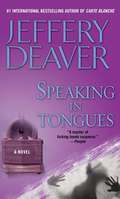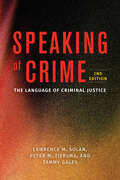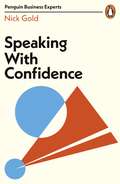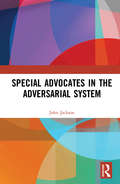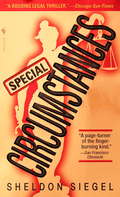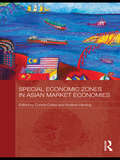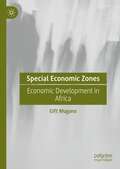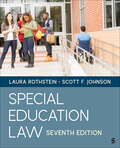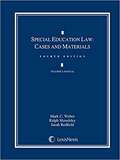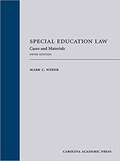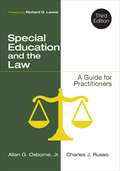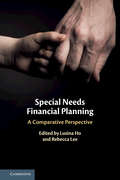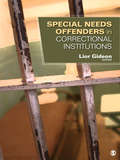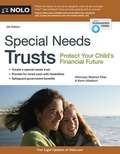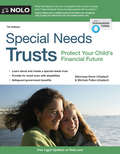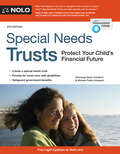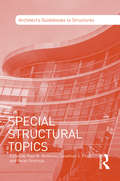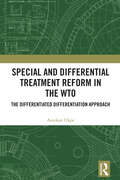- Table View
- List View
Speaking in Tongues: A Novel
by Jeffery DeaverFrom the New York Times bestselling author of Coffin Dancer and The Final Twist comes a gripping story about Two men of words, one who seeks only peace—the other, violence. Tate Collier, once one of the country's finest trial lawyers, is trying to forget his past. Now a divorced gentleman farmer, land developer, and community advocate in rural Virginia, he's regrouping from some disastrous mistakes in the realms of love and the law. But controversy—and danger—seem to have an unerring hold on Tate. Even as he struggles to rebuild his life, his alter ego is plotting his demise. Aaron Matthews, a brilliant psychologist, has turned his talents away from curing patients to far deadlier goals. He's targeted Tate, Tate's ex-wife, Bett, and their estranged daughter, Megan, for unspeakable revenge. Matthews, ruthless and hell-bent, will destroy anything that inhibits his plans. When their daughter disappears, Tate and Bett reunite in a desperate, heart-pounding attempt to find her and to stop Matthews, a psychopath whose gift of a glib tongue and talent for coercion are as dangerous as knives and guns. Featuring an urgent race against the clock, gripping details of psychological manipulation, and the brilliant twists and turns that are trademark Deaver, Speaking in Tongues delivers the suspense punch that has made this author a bestseller. It will leave you speechless.
Speaking of Crime: The Language of Criminal Justice (Chicago Series in Law and Society)
by Lawrence M. Solan Peter M. Tiersma Tammy GalesAn essential introduction to the use and misuse of language within the criminal justice system, updated for a new generation. Does everyone understand the Miranda warning? Why do people confess to a crime they did not commit? Can linguistic experts identify who wrote an anonymous threatening letter? Since its first publication, Speaking of Crime has been answering these questions. Introducing major topics and controversies at the intersection of language and law, Lawrence M. Solan, Peter M. Tiersma, and Tammy Gales apply multidisciplinary insights to examine the complex role of language within the US justice system. The second edition features in-depth discussions of recent cases, new legislation, and innovative research advances, and includes a new chapter on who interprets the laws governing linguistic contexts. Thoroughly updated and approachable, Speaking of Crime is a state-of-the-art survey that will be useful to scholars, students, and practitioners throughout the criminal justice system.
Speaking with Confidence (Penguin Business Experts Series)
by Nick GoldDoes the thought of delivering a presentation make your heart skip a beat? Do your pitches fall flat no matter how much preparation you put in? Are you often comparing yourself to more eloquent speakers and wondering how they capture the room?At some point in our careers we will need to speak in front of an audience; whether to present our ideas to a group of five in a meeting, pitch for investment in front of a panel or deliver a keynote speech to one thousand delegates. Yet glossophobia, or the fear of public speaking, is incredibly common and can inhibit our chances of career progression by up to 15%. In Speaking with Confidence, Expert and managing director of Speakers' Corner Nick Gold, shows how anyone can learn to be a confident public speaker and use their surroundings to give them the support and structure they need to achieve maximum impact and success from their speech. His decades of experience coaching and producing some of the best speakers in the country have been condensed here into one expert guide to help you connect with your audience every time.
Special Advocates in the Adversarial System
by John JacksonThe last twenty years have seen an unprecedented rise in the use of secret courts or ‘closed material proceedings’ largely brought about in response to the need to protect intelligence sources in the fight against terrorism. This has called into question the commitment of legal systems to long-cherished principles of adversarial justice and due process. Foremost among the measures designed to minimise the prejudice caused to parties who have been excluded from such proceedings has been the use of ‘special advocates’ who are given access to sensitive national security material and can make representations to the court on behalf of excluded parties. Special advocates are now deployed across a range of administrative, civil and criminal proceedings in many common law jurisdictions including the UK, Canada, New Zealand, Hong Kong and Australia. This book analyses the professional services special advocates offer across a range of different types of closed proceedings. Drawing on extensive interviews with special advocates and with lawyers and judges who have worked with them, the book examines the manner in which special advocates are appointed and supported, how their position differs from that of ordinary counsel within the adversarial system, and the challenges they face in the work that they do. Comparisons are made between different special advocate systems and with other models of security-cleared counsel, including that used in the United States, to consider what changes might be made to strengthen their adversarial role in closed proceedings. In making an assessment of the future of special advocacy, the book argues that there is a need to reconceptualise the unique role that special advocates play in the administration of justice.
Special Agent Man: My Life in the FBI as a Terrorist Hunter, Helicopter Pilot, and Certified Sniper
by Steve MooreFor decades, movies and television shows have portrayed FBI agents as fearless heroes leading glamorous lives, but this refreshingly original memoir strips away the fantasy and glamour and describes the day-to-day job of an FBI special agent. The book gives a firsthand account of a career in the Federal Bureau of Investigation from the academy to retirement, with exciting and engaging anecdotes about SWAT teams, counterterrorism activities, and undercover assignments. At the same time, it challenges the stereotype of FBI agents as arrogant, case-stealing, suit-wearing stiffs with representations of real people who carry badges and guns. With honest, self-deprecating humor, Steve Moore's narrative details his successes and his mistakes, the trauma the job inflicted on his marriage, his triumph over the aggressive cancer that took him out of the field for a year, and his return to the Bureau with renewed vigor and dedication to take on some of the most thrilling assignments of his career. Steve Moore is a former agent of the Federal Bureau of Investigation who had assignments as a SWAT team operator, sniper, pilot, counterterrorist, and undercover agent. He received multiple awards from the Department of Justice before his retirement in 2008, has written two episodes for an FBI-themed TV series, and is a regular commentator for Headline News. He lives in Thousand Oaks, California.
Special Circumstances
by Sheldon SiegelIntroducing an electrifying new voice in legal fiction--in a phenomenal thriller unlike anything you've read before. . . Debut author Sheldon Siegel bursts into the legal arena with a riveting courtroom drama, exposing the world of big-time law firms and lawyers in a sharp-witted, wonderfully sardonic page-turner of a novel. Meet Mike Daley. Ex-priest. Ex-public defender. Ex-husband. And as of yesterday, ex-partner at Simpson & Gates, one of San Francisco's most prominent law firms. Today he's out on his own, setting up a private practice on the wrong side of town. Then his best friend and former colleague is charged with a brutal double murder. Daley has his first client--and is instantly catapulted into a high-profile case involving the prestigious law firm that just booted him. The victims are one of Simpson & Gates's most powerful partners and a beautiful young associate. There's a suicide note on the partner's computer, but neither the police nor the ambitious district attorney believe it's authentic--and they think the man they've arrested is the killer. It's up to Mike Daley to prove them wrong, but time is very short. As Daley prepares his case, he begins to uncover the firm's dirtiest secrets--and dirty they are--but he also discovers that his friend, too, has a lot to hide. Even as the trial is under way, Daley and his investigators are still frantically digging for evidence that will clear their client. Against a chorus of morning press reports and nightly TV commentaries picking apart each day's session, Daley comes to realize that ambition, politics, greed, and long-standing grudges will play just as important a role in the outcome as truth and justice. This is the real world of law practice at work, and it's as ruthless as it is startling. Brilliantly paced, witty, crackling with energy and suspense,Special Circumstancesnot only brings us to a stunning denouement; it zestfully reminds us why we love to hate lawyers--but can't get enough of courtroom drama when it's done this well. In a stunning turn of events, Daley's best friend, an ex-colleague, is charged with the double murder of two lawyers at the old firm and asks Daley to defend him. Cobbling together a defense team composed of himself, his ex-wife, and a onetime courtroom fixture named Mort Goldberg who's been wished on him against his better judgment, Daley finds he's got more to defend than his friend's innocence. The newly elected media-hungry District Attorn- ey, also a former colleague, will prosecute the case himself. As court is called into session, it becomes clear that in this trial ambition, honor, friendship, greed, and longstanding grudges will play as important a role as truth and justice. Rarely has a legal thriller debut so accurately depicted not only the inner workings of the legal system but the crack-ling energy it takes to build and defend a felony case. In SPECIAL CIRCUMSTANCES author Sheldon Siegel reminds us why we love to hate lawyers -- but can't get enough of courtroom drama when it's done this well. -->
Special Economic Zones in Asian Market Economies (Routledge Studies in the Growth Economies of Asia)
by Connie CarterSpecial Economic Zones (SEZs) have proliferated rapidly during the past decade and are set to multiply in the next – embracing not only Asia and Europe but also Africa and the Americas. This book is the first to examine the Asian experience of SEZs in China, India, Malaysia and the Philippines. SEZs are usually clearly defined geographic areas in which national, provincial or local governments use policy tools (such as tax holidays; improved infrastructure; less onerous or differentiated regulations and incentives other than those generally available in the rest of the country) to attract and promote private - usually foreign - investment from enterprises which commit to create employment and to export their products or services, and generating foreign currency for the host country. SEZs have been especially successful in bringing about economic development in Asia, especially in China. This book examines the origins, nature and status of special economic zones in Asia, together with the current trends connected with them, and the challenges they currently face. Although the World Trade Organisation cast doubts in 1995 on the future of special economic zones as a viable policy tool in the development agenda, special economic zones continue to be used, and favoured, as a way of encouraging foreign investment and economic development, with for example India, trying to emulate China, reincorporating special economic zones into its development policy. This book provides regional case studies of SEZs in Asian market economies to analyse the extent to which these zones serve the changing needs of Asian development.
Special Economic Zones: Economic Development in Africa
by Gift MuganoThis book provides a guide to the challenges of special economic zones. Focusing on Africa, while also discussing China, Taiwan, Dominican Republic, Malaysia, and South Korea, the impact on economic development of special economic zones is analysed to highlight the successes and failures of these zones. New emerging issues, such as the sustainable development goals and the fourth industrial revolution, are presented as factors that need to be addressed in order for special economic zones to be productive in Africa. The role of foreign direct investments, job creation, industrialization, and regulation is also discussed.Special Economic Zones: Economic Development in Africa aims to set out an empirical framework on how to create effective special economic zones. It will be relevant to researchers and policymakers interested in African and development economics.
Special Education Advocacy
by Ruth Colker Julie K. WaterstoneAn edition that uses the advocacy approach to develop a set of materials of teaching children in the special education sector. This book presents the major principles to successful advocacy on behalf of special needs children by using meaningful real life experience.
Special Education Law
by Laura F. Rothstein Scott F. JohnsonThe 7th Edition of Special Education Law, written by Laura Rothstein and Scott F. Johnson, provides a comprehensive and current overview of the major federal law, and judicial interpretations of those laws, that apply to special education students. School administrators and attorneys attend to special education issues on a regular basis, and local superintendents, principals, special education professionals, psychologists, and regional and state administrators must also be familiar with the legal requirements of educating students with disabilities. Classroom teachers of all types need to be aware of the laws that affect them and their students. Special Education Law 7e is intended for students in education and educational administration, both graduate and undergraduate, as well as law students in courses on special education law, school law, and special education. The framework of this book begins with five introductory chapters on the major issues that are addressed in special education law. These topics include an overview the legal system, the history of special education, major statutes in special education law, stakeholders such as students, families, educators, and advocates, and finally, requirements for protection under various special education laws. The remainder of the text presents and analyzes special education case law within specific contexts. The text helps educators understand what the law requires so that they can make decisions that comply with these laws. The 7th edition reflects major changes in judicial interpretation and education policy developments at the federal level since 2021, including the dramatic impact of the COVID pandemic on education generally and special education specifically, a new Supreme Court decision, and new references and examples throughout.
Special Education Law
by Laura F. Rothstein Scott F. JohnsonThe 7th Edition of Special Education Law, written by Laura Rothstein and Scott F. Johnson, provides a comprehensive and current overview of the major federal law, and judicial interpretations of those laws, that apply to special education students. School administrators and attorneys attend to special education issues on a regular basis, and local superintendents, principals, special education professionals, psychologists, and regional and state administrators must also be familiar with the legal requirements of educating students with disabilities. Classroom teachers of all types need to be aware of the laws that affect them and their students. Special Education Law 7e is intended for students in education and educational administration, both graduate and undergraduate, as well as law students in courses on special education law, school law, and special education. The framework of this book begins with five introductory chapters on the major issues that are addressed in special education law. These topics include an overview the legal system, the history of special education, major statutes in special education law, stakeholders such as students, families, educators, and advocates, and finally, requirements for protection under various special education laws. The remainder of the text presents and analyzes special education case law within specific contexts. The text helps educators understand what the law requires so that they can make decisions that comply with these laws. The 7th edition reflects major changes in judicial interpretation and education policy developments at the federal level since 2021, including the dramatic impact of the COVID pandemic on education generally and special education specifically, a new Supreme Court decision, and new references and examples throughout.
Special Education Law Case Studies: A Review From Practitioners
by David F. BatemanTremendous changes have occurred over the past decade in the provision of services to students with disabilities. Federal mandates continue to define requirements for a free appropriate public education (FAPE) in the least restrictive environment. Additionally, there has been an increase in the number of lawsuits filed against school districts regarding the provision of educational services for students with disabilities. Case studies are a helpful way to understand these difficult issues. The case studies presented here are actual students eligible for special education and related services. The case studies are represented not to tell districts and parents that this is the only way questions about special education law can be answered, but to provide likely answers along with commentary for analysis. The cases were developed to help new (and experienced) special education leaders and supervisors survive the pressures of working with students with disabilities while working to provide appropriate services and prevent litigation.
Special Education Law: Cases and Materials
by Mark C. Weber Ralph Mawdsley Sarah RedfieldThis book contains relevant statutory excerpts and carefully edited reports of the leading special education cases, together with extensive explanatory materials and provocative questions for class discussion. <p><p> The book also features practical exercises for home assignments or in-class projects. Two of the co-authors teach in law schools and have deep experience in special education law as well as allied subjects such as constitutional law, administrative law, civil procedure, federal courts, and general school law. Their background enables them to discuss the special education topics thoroughly and to draw connections to other parts of the law school curriculum. The third co-author, who is also a lawyer, teaches educational administration as well as special education law; that background enables him to add lessons on the real-world impact of the law on the daily work of the schools. <p><p> The Fourth Edition includes new cases on eligibility, damages, and other topics, as well as coverage of the new Infant and Toddler Program regulations.
Special Education Law: Cases and Materials
by Mark C. WeberThis new fifth edition contains case text as well as extensive analysis and commentary for Endrew F. v. Douglas County and Frye v. Napoleon Community Schools. It also includes carefully edited reports of a host of other recent court decisions, including <p><p> • Krawietz v. Galveston Independent, Spring Branch v. O.W., and P. v. West Hartford on child-find duties,<p> • Independent School District No. 283 v. E.M.D.H. on evaluation,<p> • D.L. v. St. Louis on services for children with autism spectrum disorder,<p> • Albright v. Mountain Home on IEPs,<p> • L.H. v. Hamilton County and C.D. v. Natick on least restrictive environment, and<p> • A.G. v. Paradise Valley and Stanek v. St. Charles on Section 504-ADA claims. <p><p> At the same time, the book maintains comprehensive coverage of legal issues affecting schools and students from the infant and toddler program through higher education. <p><p>The new edition gives special attention to claims concerning charter schools, police intervention issues, education of children in juvenile detention, and private school students. The text includes provocative questions for discussion as well as practical exercises for students to apply their knowledge and skills.
Special Education and the Law: A Guide for Practitioners (Third Edition)
by Allan G. Osborne Charles J. RussoThis essential guide translates legalese into your language and allows the special education teacher to focus on your core competency: providing excellent education for students with special needs.
Special Needs Financial Planning: A Comparative Perspective
by Rebecca Lee Lusina HoCountries around the world are facing pressing needs to enhance financial planning mechanisms for individuals with cognitive impairment. The book provides the first comparative study of the three most common of such mechanisms in Asia and the West, namely guardianship, enduring/lasting powers of attorney, and special needs trusts. It involves not only scholarly overviews of the mechanisms in the jurisdictions studied, but also thorough, structured and critical reviews of their operational experiences. This book will have broad appeal to scholars, students, law and policy makers and practitioners in the fields of mental disability, healthcare and elder law. It is widely recognised in the field that books like this one are needed. This book will also be of interest to undergraduate and graduate students in mental health, disability law and elder law.
Special Needs Offenders in Correctional Institutions
by Lior GideonEffective treatment and preparation for successful reintegration can be better achieved if the needs and risks of incarcerated offenders are taken into consideration by correctional practitioners and scholars. Special Needs Offenders in Correctional Institutions offers a unique opportunity to examine the different populations behind bars (e.g. chronically and mentally ill, homosexual, illegal immigrants, veterans, radicalized inmates, etc.), as well as their needs and the corresponding impediments for rehabilitation and reintegration. Author Lior Gideon takes a rehabilitative and reiterative approach to discuss and differentiate between the needs of these various categories of inmates, and provides in depth discussions-not available in other correctional texts-about the specific needs, risks and policy recommendations when working with present-day special needs offenders. Each chapter is followed by suggested readings and relevant websites that will enable readers to further enhance understanding of the issues and potential solutions discussed in the chapter. Further, each chapter has discussion questions specifically designed to promote class discussions. The text concludes with a theoretical framework for future policy implications and practices.
Special Needs Trusts
by Stephen EliasCreate a special needs trust for a loved one's care and get peace of mind If you care for a child or other loved one with a disability, you've no doubt thought about what will happen when you're no longer able to give that care. Fortunately, there's a simple solution to this dilemma create a "special needs trust." Special Needs Trusts shows you how to leave any amount of money to your disabled loved one without jeopardizing government benefits. It provides plain English information and forms that let you create a special needs trust by modifying your will or living trust document. Funds in a special needs trust can make a big difference in quality of life by paying for: . annual independent check ups . personal care attendant or escort . vehicles and transportation . insurance . rehabilitation . essential dietary needs . materials for recreation . trips or vacations . entertainment . athletic training or competitions . and much more. Special Needs Trusts also provides a formal letter to the trustee, which explains this very important role, and a personal letter to the trustee, which provides crucial information about your loved one. This edition has been thoroughly revised to reflect the latest changes in the law, including updated eligibility requirements for government benefits, current resources, and an experienced perspective about when to make a special needs trust on your own and when to seek the services of an attorney. Forms are available to download at nolo.com.
Special Needs Trusts: Protect Your Child's Financial Future
by Kevin Urbatsch Michele Fuller-UrbatchSpecial Needs Trusts shows you how to leave any amount of money to your disabled loved one -- without jeopardizing government benefits. It provides plain-English information and forms you need to create a special needs trust. Funds in a special needs trust can make a big difference in quality of life by paying for: annual independent check-ups personal care attendant or escort vehicles and transportation insurance rehabilitation essential dietary needs materials for recreation trips or vacations entertainment athletic training or competitions, and much more. Special Needs Trusts also provides a formal letter to the trustee, which explains this very important role, and a personal letter to the trustee, which provides crucial information about your loved one. Author Kevin Urbastch gives you an experienced perspective about when to make a special needs trust on your own and when to seek the services of an attorney. This edition has been thoroughly revised to provide: current eligibility requirements for government benefits helpful resources a new chapter on letters of intent a new chapter on ABLE accounts
Special Needs Trusts: Protect Your Child's Financial Future
by Kevin Urbatsch Michele Fuller-UrbatchLeave money to a loved one with a disability—without losing benefits Use a special needs trust to provide financial security for your child (or anyone) with a disability, without jeopardizing important government benefits. Funds in a special needs trust do not count against eligibility for benefits and can be used to improve the quality of your child’s life. This book provides everything you need to know about special needs trusts—whether you make one yourself or have an attorney draft one for you. The authors explain: how special needs trusts work the trustee’s role ways to pass important information to successor trustees the pros and cons of joining a pooled trust, and creating special needs trust with or without a lawyer. This edition is thoroughly updated and includes new chapters on ABLE accounts and letters of intent. All forms are downloadable through a special link in the book.
Special Needs Trusts: Protect Your Child's Financial Future (2nd edition)
by Stephen EliasIf you care for a child or other loved one with a disability, you've no doubt thought about what will happen when you're no longer able to give that care. Fortunately, there's a simple solution to this dilemma -- create a "special needs trust." Special Needs Trusts shows you how to leave any amount of money to your disabled loved one, without jeopardizing government benefits. It provides plain-English information and forms that let you create a special needs trust by modifying your will or living trust document.
Special Olympics Oral History Volume 4: Different Stories but One Effort (Economy and Social Inclusion)
by William P. Alford Mei Liao Fengming CuiThis open access book commemorates the 50th anniversary of the Special Olympics (1968-2018). This is the fourth volume of the first oral history about people with intellectual disabilities in the world and the first oral history of persons with disabilities in China. This book also includes stories from teachers, coaches, school principals, parent leaders, coworkers, and volunteers. They share their personal views on people with intellectual disabilities. The book also includes observations and records of what people with intellectual disabilities and others do on a certain day. It uses sociology and oral history to give an objective, neutral account of the lives of people with intellectual disabilities in China. It helps readers understand how the Special Olympics movement, public policies, social environment, and self-cognition affect people with intellectual disabilities.
Special Operations Group
by Christophe GlaslThe Special Operations Group are ultra-fit, highly trained officers brought in to do the jobs other police cannot. Since he was a nineteen-year-old recruit with Victoria Police, Chris Glasl aspired to join this elite group - the SOG were untouchable, indestructible and bonded so closely together they were a brotherhood like no other. But when Chris achieved his dream in 1994, the brotherhood he thought he was joining didn't exist.Special Operations Group is Chris's story of his life in the SOG - where solidarity, camaraderie and loyalties were undermined by bullying, bastardisation, drug use, lies and betrayal. It is a raw, behind-the-scenes look at what went on at the SOG, and a gripping account of major jobs he attended: fatal shootings, a triple murder, a 100-million-dollar drug bust and the Port Arthur massacre, to name just a few. For Chris, eventually the work, culture and his struggle with drugs and alcohol took its toll. This is a white-knuckle ride of a story as he tells it like it was and comes to grips with his past.
Special Structural Topics (Architect's Guidebooks to Structures)
by Paul W. McMullin Jonathan S. Price Sarah SimchukSpecial Structural Topics covers specialty structural situations for students and professional architects and engineers, such as soil mechanics, structural retrofit, structural integrity, cladding design, blast considerations, vibration, and structural sustainability. As part of the Architect’s Guidebooks to Structures series, it provides a comprehensive overview using both imperial and metric units of measurement with more than 150 images. As a compact summary of key ideas, it is ideal for anyone needing a quick guide to specialty structural considerations.
Special and Differential Treatment Reform in the WTO: 'The Differentiated Differentiation Approach
by Aniekan UkpeThis book proposes a new approach to differentiating between developing countries in the context of special and differential treatment (SDT) in the World Trade Organisation.Offering unique insights into SDT reform in the WTO, the book proposes the method of differentiated differentiation and demonstrates its operationalization using the WTO Customs Valuation Agreement. Through identifying key indicators to categorize constraints faced by developing countries, the book establishes objective criteria to depoliticize access to SDT. Promoting a case-by-case approach, the book also employs a statistics-based score procedure to determine a threshold for graduating countries out of SDT. Through flexible tracking and evidence-based arguments, the book provides a transitional method of reform which maintains full compliance with WTO members’ obligations.The book will be of importance to academics and students of international law, especially those with an interest in international trade law and the WTO, as well as legal professionals and policymakers.
